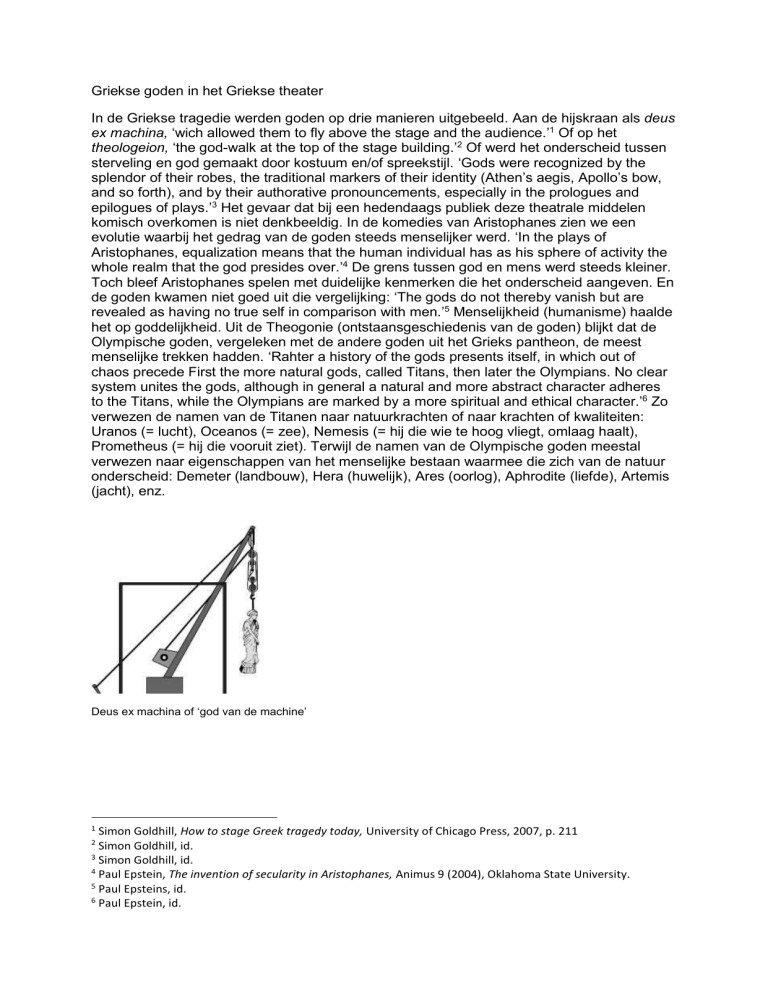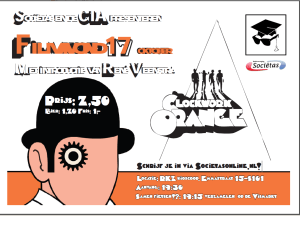
Griekse goden in het Griekse theater
In de Griekse tragedie werden goden op drie manieren uitgebeeld. Aan de hijskraan als deus
ex machina, ‘wich allowed them to fly above the stage and the audience.’1 Of op het
theologeion, ‘the god-walk at the top of the stage building.’2 Of werd het onderscheid tussen
sterveling en god gemaakt door kostuum en/of spreekstijl. ‘Gods were recognized by the
splendor of their robes, the traditional markers of their identity (Athen’s aegis, Apollo’s bow,
and so forth), and by their authorative pronouncements, especially in the prologues and
epilogues of plays.’3 Het gevaar dat bij een hedendaags publiek deze theatrale middelen
komisch overkomen is niet denkbeeldig. In de komedies van Aristophanes zien we een
evolutie waarbij het gedrag van de goden steeds menselijker werd. ‘In the plays of
Aristophanes, equalization means that the human individual has as his sphere of activity the
whole realm that the god presides over.’4 De grens tussen god en mens werd steeds kleiner.
Toch bleef Aristophanes spelen met duidelijke kenmerken die het onderscheid aangeven. En
de goden kwamen niet goed uit die vergelijking: ‘The gods do not thereby vanish but are
revealed as having no true self in comparison with men.’5 Menselijkheid (humanisme) haalde
het op goddelijkheid. Uit de Theogonie (ontstaansgeschiedenis van de goden) blijkt dat de
Olympische goden, vergeleken met de andere goden uit het Grieks pantheon, de meest
menselijke trekken hadden. ‘Rahter a history of the gods presents itself, in which out of
chaos precede First the more natural gods, called Titans, then later the Olympians. No clear
system unites the gods, although in general a natural and more abstract character adheres
to the Titans, while the Olympians are marked by a more spiritual and ethical character.’6 Zo
verwezen de namen van de Titanen naar natuurkrachten of naar krachten of kwaliteiten:
Uranos (= lucht), Oceanos (= zee), Nemesis (= hij die wie te hoog vliegt, omlaag haalt),
Prometheus (= hij die vooruit ziet). Terwijl de namen van de Olympische goden meestal
verwezen naar eigenschappen van het menselijke bestaan waarmee die zich van de natuur
onderscheid: Demeter (landbouw), Hera (huwelijk), Ares (oorlog), Aphrodite (liefde), Artemis
(jacht), enz.
Deus ex machina of ‘god van de machine’
1
Simon Goldhill, How to stage Greek tragedy today, University of Chicago Press, 2007, p. 211
Simon Goldhill, id.
3
Simon Goldhill, id.
4
Paul Epstein, The invention of secularity in Aristophanes, Animus 9 (2004), Oklahoma State University.
5
Paul Epsteins, id.
6
Paul Epstein, id.
2












